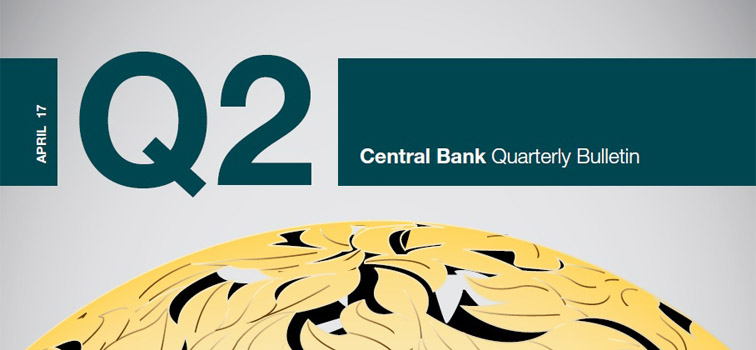"Main impetus to growth in 2017 and 2018 is expected to come from the projected strength of domestic demand" - Quarterly Bulletin 2 of 2017
06 April 2017
Press Release

- Irish economy continues to grow, with evidence pointing toward a broadening of the recovery of the domestic economy.
- Growth forecast raised from previous Bulletin, with underlying domestic demand projected to grow by 4.0 per cent in 2017.
- Brexit remains the main downside risk to the economy, alongside the changing international political and economic policymaking landscape.
The Central Bank of Ireland has published the second Quarterly Bulletin for 2017. The Bulletin examines recent trends in the domestic economy and provides the Central Bank’s forecasts for the Irish economy and its views on domestic macroeconomic policy issues.
The Bulletin reports:
- The overall growth outlook remains relatively positive. However, uncertainty persists in relation to the external environment and risks to the forecasts are weighted to the downside.
- Recent evidence points to a broadening of recovery on the domestic side of the economy, with consumer spending continuing to grow solidly and the revival of the construction sector gaining traction.
- The economic impact of Brexit in the long and short term on Ireland is set to be negative. Reflecting this, the Central Bank revised down its economic forecasts in the wake of the UK referendum.
Chief Economist Gabriel Fagan said: “the evidence points to an economy which continues to grow at a healthy pace, supported by strong domestic spending and activity data. We expect that growth in 2017 and 2018 will come from the projected growth in domestic demand, reflected in solid growth in consumer spending and underlying investment. This is supported by strong growth in employment, which grew in 2016 at the fastest rate in almost a decade.
However, risks continue to be on the downside, with the outlook characterised by uncertainty about the external environment, both in relation to Brexit and the changing political and economic policymaking landscape. To date the impact of Brexit has been mainly experienced through currency depreciation, however those sectors with a high dependency on exports to the UK remain exposed to any future adverse UK economic developments and also the threat of new barriers to trade. In relation to global risk factors, any increase in protectionism is sure to post a challenge for Irish resident exporters, especially in the multinational sector.”
A video of the Chief Economist, Gabriel Fagan, discussing the Quarterly Bulletin is available on the Central Bank YouTube channel.